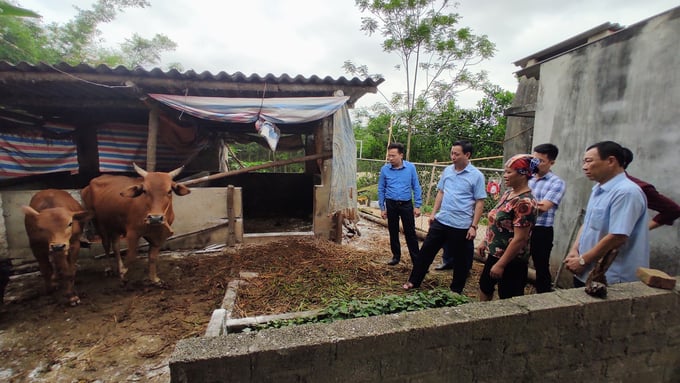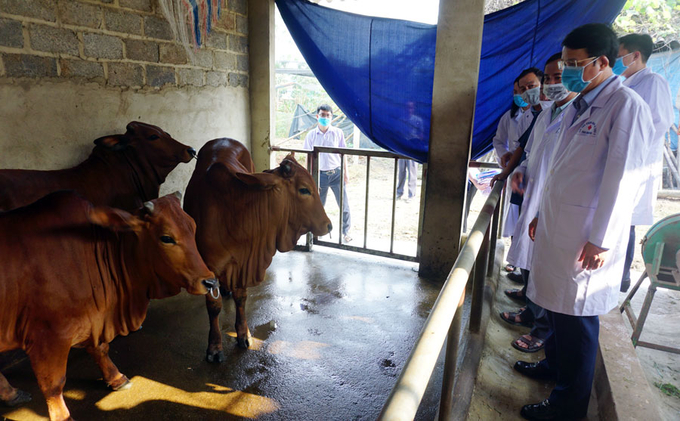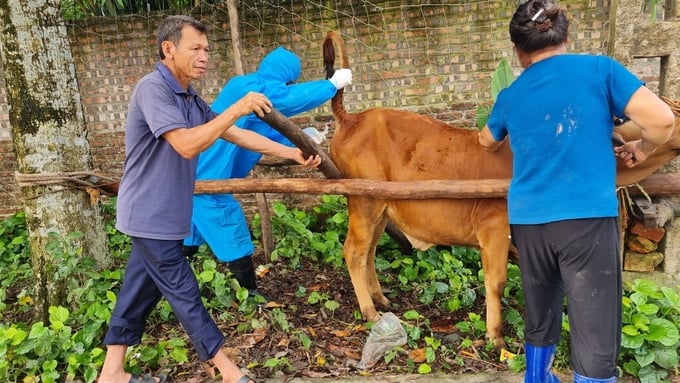May 29, 2025 | 08:28 GMT +7
May 29, 2025 | 08:28 GMT +7
Hotline: 0913.378.918
May 29, 2025 | 08:28 GMT +7
Hotline: 0913.378.918

A consistent occurrence of Lumpy Skin Disease has been observed in cattle herds within Thai Nguyen province. Photo: Pham Hieu.
According to Thai Nguyen province's Department of Livestock Production, Animal Health and Aquaculture, there has been a consistent occurrence of Lumpy Skin Disease in cattle herds within Thai Nguyen province, albeit with a limited number of cases.
Accordingly, Lumpy Skin Disease was detected in eight cattle across various communes between mid-April and early May. These locations include Khe Mo, Cay Thi, and Song Cau towns in Dong Hy district. Additionally, two cattle in Luong Son ward, Song Cong city exhibited symptoms of Lumpy Skin Disease between late May and early June.
After conducting tests and confirming the presence of Lumpy Skin Disease in these locations, Thai Nguyen province's Department of Livestock Production, Animal Health and Aquaculture collaborated with local governments to implement control measures and effectively address the outbreaks. This proactive approach aimed to prevent the further spread of the disease within the province. Consequently, no new cases have been reported in over 21 days since the discovery of Lumpy Skin Disease in Dong Hy district.
On the other hand, local governments in Luong Son ward have also taken active measures to control the outbreak of Lumpy Skin Disease. According to Ms. Duong Thi Luu, Chairwoman of Luong Son ward People's Committee, the local governments have assigned officers to provide direct guidance on isolation, care, and treatment of sick cattle. Additionally, they have carried out sanitation and disinfection, detoxification of livestock pens and environments with the goal of eliminating intermediate disease carriers. Most notably, comprehensive and regulated disposal methods have been implemented for one sick cattle that died from Lumpy Skin Disease. Additionally, a commitment has been made to cattle farmers to promote disease prevention and control, with recommendations against sharing grazing areas for different herds.
Luong Son ward has also initiated a livestock census to identify cattle and buffalo that have not received vaccinations against Lumpy Skin Disease, thereby guiding livestock farmers to register for supplementary vaccination for their herds.

Many farmers have failed to carry out the vaccination against Lumpy Skin Disease for their cattle and buffalo herds. Photo: Pham Hieu.
In addition to Dong Hy district and Song Cong city, Lumpy Skin Disease in cattle and buffalo were reported in four households across three communes in August 2023. The affected communes include Thuong Nung, Cuc Duong, and Vu Chan in Vo Nhai district. Accordingly, six cattle were affected, with one weighing 175 kilograms having died and been disposed of. The disease outbreak's cause was determined to be the indifference of the local farmers, who have failed carry out vaccination against Lumpy Skin Disease for their cattle and buffalo herds.
Immediately upon detecting the outbreak, Thai Nguyen province's Department of Livestock Production, Animal Health and Aquaculture, in coordination with the Vo Nhai District People's Committee, directed the implementation of containment measures, and disease management. Subsequently, the Lumpy Skin Disease outbreak was brought under control, with no widespread outbreaks occurring.
After nearly one month of treatment, three cattle infected with Lumpy Skin Disease belonging to Mr. Hoang Van Mao's family in Cuc Duong commune, Vo Nhai district, have recovered.
"Upon noticing signs of the disease in our cattle herd, my family reported to the local governments and received support from animal health officers, who provided supplies and chemicals for the sanitation and disinfection of the pens, as well as insecticide spraying. Additionally, we actively took care of the cattle, provided them with green vegetables, and administered various medications as recommended by the professional agencies to boost their immunity," explained Mr. Hoang Van Mao.
Regarding local disease control efforts, Ms. Dang Thi Hieu, Deputy Director of Vo Nhai District's Agricultural Service Center, stated that upon discovering the outbreak, the District Steering Committee for Animal Disease Prevention and Control provided 1,000 doses of vaccine for a ring vaccination campaign. Furthermore, the Center directed local governments to raise awareness regarding the dangers of the disease, mobilized residents to restrict free-range livestock farming, and imposed a strict ban on the sale of diseased animals.

Local governments must place emphasis on the monitoring of diseases in cattle herds, especially in areas with a high risk of disease or existing outbreak hotspots. This proactive approach aims to promptly detect, alert, and address new disease outbreaks as soon as they are identified. Photo: Pham Hieu.
In order to prevent the widespread transmission of Lumpy Skin Disease in cattle, Thai Nguyen province's Department of Agriculture and Rural Development has proposed local People's Committees to strengthen disease monitoring in livestock herds, especially in areas with a high risk of disease or existing outbreak hotspots. This proactive approach aims to promptly detect, alert, and decisively address new disease outbreaks as soon as they are identified.
Furthermore, the Department of Agriculture and Rural Development has instructed local governments to strengthen inspections involving the collection and trading of animals and animal products. Stakeholders have also been requested to handle cases involving the transportation and commerce of animals and animal products under suspicion of infection, unauthorized importation, or of unknown origin. Additionally, local governments should conduct a comprehensive review and inventory of livestock herds to facilitate vaccination campaigns, thereby ensuring that vaccination coverage reaches over 80% of the total cattle population.
According to Mr. Do Dinh Trung, Deputy Director of the Thai Nguyen province's Department of Livestock Production, Animal Health and Aquaculture, the most effective solution for preventing Lumpy Skin Disease is the widespread vaccination of cattle. Subsequently, the Department will continue to collaborate with local governments to promote and mobilize livestock farmers in the registration for Lumpy Skin Disease vaccination. The parties aim to deploy 60,000 doses of Lumpy Skin Disease vaccine, which accounts for 80% of the total cattle population.
Additionally, local governments are encouraged to strengthen their inspections and monitoring of disease prevention and control efforts, with adherence to the "5 No's" principle: no concealing outbreaks, no trading, no transportation, no slaughter for consumption, no disposal in the environment, and no use of excess untreated food as livestock feed.
The Thai Nguyen province's Department of Livestock Production, Animal Health and Aquaculture also emphasized that livestock which died from Lumpy Skin Disease must be disposed in accordance with disease prevention and control regulations. These regulations are crucial to prevent further spread and avoid losses for livestock farmers. Moreover, both local governments and the public should proactively implement preventive measures for other diseases affecting livestock outside of Lumpy Skin Disease.
According to Thai Nguyen province's Department of Livestock Production, Animal Health and Aquaculture, the current hot and humid weather reduces the resistance of cattle, leading to favorable conditions for the persistence and widespread transmission of disease pathogens. Blood-sucking insects also proliferate in these conditions, exacerbating the situation as a result.
In addition, the care, nourishment, and enhancement of immunity in cattle have not received adequate attention. Several households within the province are neglectful towards the vaccination of their cattle and the report of disease outbreaks. Immediate corrective action is imperative in remote and rural areas, where disease monitoring and reporting may be delayed.
Thai Nguyen province's Department of Livestock Production, Animal Health and Aquaculture advises local residents to regularly disinfect and detoxify livestock pens in order to eliminate disease pathogens, provide sufficient nutrition, and administer all required vaccinations to their livestock. Furthermore, farmers must promptly report to relevant authorities upon discovering signs of disease in their livestock. It is essential to refrain from the trading and slaughtering infected or suspected cattle.
Translated by Nguyen Hai Long
/2025/05/25/4127-3-073637_820.jpg)
(VAN) Thanks to the promotion from an FAO-implemented project, vegetable production in greenhouses in Moc Chau has seen strong development, from 1.5 hectares in 2021 to nearly 50 hectares in 2024.

(VAN) FAO has recently supported USD 140,000 to implement the project 'Risk mitigation human-animal interface risks through disease control initiatives in pig farming.'

(VAN) The People's Committee of Tra Vinh province has approved an adjustment to the investment policy for the Green Hydrogen Plant project, increasing its area to approximately 52.76 hectares.
![Reducing emissions from rice fields: [2] Farmers’ commitment to the soil](https://t.ex-cdn.com/nongnghiepmoitruong.vn/608w/files/news/2025/05/05/dsc08881jpg-nongnghiep-140632.jpg)
(VAN) Clean rice cultivation model in Thuong Tan commune, Bac Tan Uyen district, is assisting local residents in achieving sustainable agriculture by substantially reducing costs, increasing productivity, and protecting the environment.

(VAN) At the conference to disseminate Resolution No. 68, AgriS introduced its digital agricultural ecosystem and reaffirmed its commitment to accompanying the Government in promoting private sector development and sustainable agriculture.

(VAN) 'Blue Ocean - Blue Foods' initiative is designed to restore marine ecosystems and establish sustainable livelihoods for local communities by cultivating a minimum of 1,000 hectares of cottonii seaweed in the first three years.
/2025/05/21/4642-3-112707_603.jpg)
(VAN) The V-SCOPE project has made direct contributions to three out of six pillars of the Comprehensive Strategic Partnership between Vietnam and Australia.